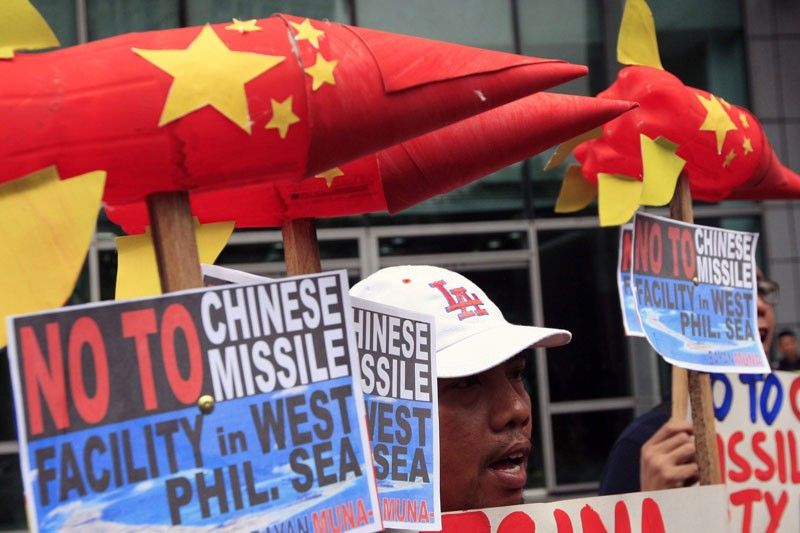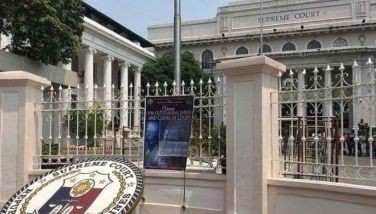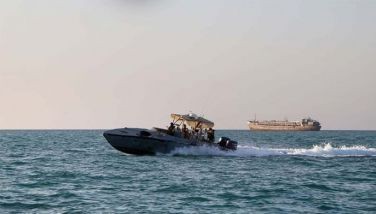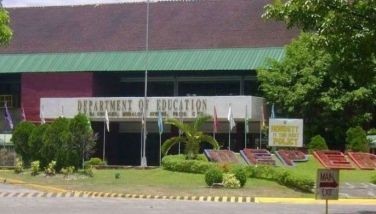Duterte won’t antagonize China over missile system

MANILA, Philippines — President Duterte will not take sides with any parties contesting China’s move to set up a missile system on some of the islands in the South China Sea.
Presidential spokesman Harry Roque Jr. said this is to avoid the Philippines from being dragged into a conflict between superpowers.
“We are not actually doing nothing but we do not want to publicly announce our moves. At the same time, the President has decided not to side with any parties regarding the latest at the West Philippine Sea for the best interest of the Filipinos, and in the name of peace,” Roque said.
He said the administration knows the realities on the ground – apparently referring to the lack of capability to fight Beijing head on.
“Let us deal with realities,” he said.
Roque said China is unlikely to heed any demand by the Philippines or any other claimant country to remove the missile system in the Spratlys.
According to Roque, the President reiterated his policy on China during a meeting with Foreign Affairs Secretary Alan Cayetano, Defense Secretary Delfin Lorenzana, along with other top officials last Monday.
“He says that he will not be involved in any armed confrontation between China and the United States. It is not to our national interest to get involved in any armed conflict although any such armed conflict is a reason for us to be concerned, because it is in our Exclusive Economic Zone, it is in our backyard,” Roque said.
“And that is why he reiterated that to him, an independent foreign policy is the best position to take,” he added.
According to Roque, the Chief Executive has expressed hope that everything will be resolved in peaceful and diplomatic means.
Sen. Paolo Benigno Aquino IV expressed suspicion that there was a quid pro quo between Duterte and Chinese President Xi Jinping that could explain China’s brazenness in deploying missiles in Philippine-claimed areas in the South China Sea.
Aquino said he was puzzled that instead of protesting China’s continued militarization of the South China Sea and demanding the dismantling of the missile systems, the Duterte administration appears to be siding with Beijing on the latest developments.
Aquino noted Duterte had several meetings with Xi both in China and other international forums.
“So what was the discussion between the Philippines and China on this militarization? Was there an agreement or deal to allow militarization or were we surprised? If so, this puts our friendship with China into question because they should not just suddenly put missiles in our own territory,” Aquino remarked.
“Was it a verbal agreement? When it comes to territory and sovereignty, and security, there should be no secret deals… and at the end of the day, is that in exchange for our territory?” he said.
An opposition member of the House of Representatives also warned of the possibility that the Philippines would be falling into China’s “debt trap diplomacy,” following President Duterte’s friendly policy towards the economic and military giant.
“The Philippines may not be at debt risk at the moment, but the uncontrolled massive borrowing of the Duterte administration may lead us to the debt trap, especially seeing the overdependence of Duterte to China,” Magdalo party-list Rep. Gary Alejano said.
Alejano called on the government to be transparent in its dealings with China, particularly on contracting loans for its Build, Build, Build infrastructure program, in relation to Beijing’s massive “One Belt, One Road” international project.
“The experiences of other countries should serve as warning on the nature of loans being generously provided by China,” he said.
Alejano cited the case of Tajikistan that was forced to give up either territory or natural resources after they were unable to pay off debts to China.
He explained Tajikistan’s debt was accumulated under China’s Belt and Road Initiative, which he described as “the core of the nation’s debt trap diplomacy.”
In Tajikistan’s case, China wrote off an unknown amount of debt in exchange for 1,158 square kilometers of disputed territory.
In another case, that of Turkmenistan, Beijing used its loans to the country to acquire natural gas largely on its terms. Sri Lanka, the widely talked about case of China’s debt trap, had to give up control on its Hambantota Port to China for 99 years.
Similar situations happened to countries such as Djibouti, Pakistan and Kenya, Alejano said.
China demanded favorable access to their strategic assets in exchange for financing and building the infrastructure these poor countries need.
In the case of Venezuela, Sudan, Angola, Kazakhstan and Iraq, Alejano said all of these countries contracted billions of loans from China and oil is being used as collateral for their debts. – With Delon Porcalla, Paolo Romero
- Latest
- Trending































